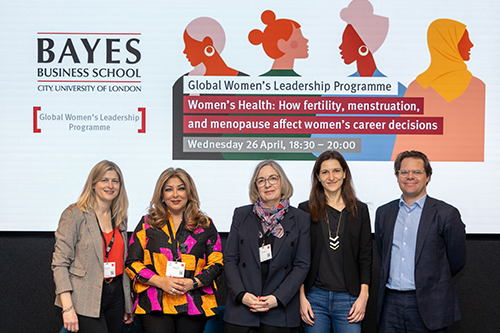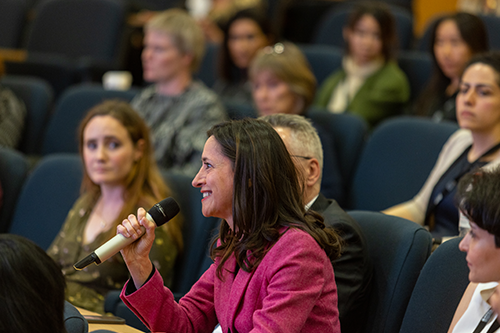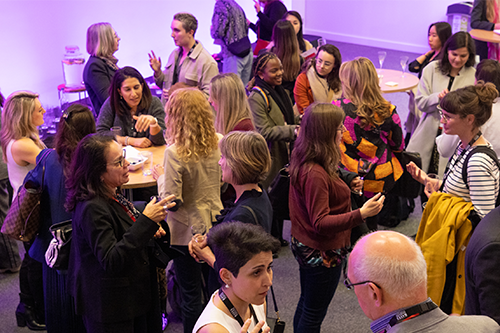Women’s health: how fertility, menstruation and menopause affect women’s career decisions
“I spent a long part of my career trying to smash through the glass ceiling,” says Sarah Garton, Managing Director at Accenture.
“When I finally got there, it was amazing. Then it all came crumbling down.”
Around the time Sarah was promoted to MD, she began experiencing brain fog, anxiety, depression and hot flashes and no longer felt like herself. She considered quitting the job she loved.
It wasn’t until she attended an internal work event called ‘Smashing the Taboo’ with guest panellists including menopause specialist Dr Louise Newsome that she realised she was experiencing symptoms of the perimenopause.
Women’s health and careers
On Wednesday 26 April, an audience of sixty people attended the latest Bayes Global Women’s Leadership Programme (GWLP) event to learn more about how women’s health impacts their careers.
The panellists were Sarah Garton, clinical embryologist Saghar Kasiri and menstruation and menopause researcher Dr Lara Owen.
The talk was moderated by Dr Janina Steinmetz, Director of the GWLP. The GWLP is Bayes’ flagship gender equality initiative and launched in 2017.

‘Menopause warriors’ are smashing the taboo
Since seeking treatment for the menopause, Sarah was promoted again and now considers herself a ‘MenoWarrior’.
With a group of fellow MenoWarriors and allies, she is advocating for better work policies that support women and people experiencing menopause in the workplace.
The MenoWarriors championed a health insurance policy that covers menopause and Accenture has since joined 600 other companies that signed up for the ‘Menopause-Friendly Employer’ accreditation.
Earlier this year, the UK government appointed Helen Tomlinson as its first ever Menopause Employment Champion or ‘Menopause Tzar’ to work on encouraging employers to develop menopause policies that help women stay and progress in work.

Menstruation policy
Dr Lara Owen teaches the master’s level course ‘Contemporary Menstrual Studies’ and is an Honorary Research Fellow at the University of Saint Andrews.
She gave examples research demonstrating the difficulties women face in the workplace: over thirty years ago, Dr Joan Acker found that workplaces were designed with male bodies in mind, and in 2019, journalist Caroline Criado Perez OBE wrote about the gender data gap and how male bodies are considered the default.
“We are still dealing with the hangover of a patriarchal society,” Lara said. “One of the best ways to control people is to make them feel ashamed for something they cannot help doing.”
In June 2023, the British Standards Institution will be publishing guidance for creating policies to support the experience of menstruation and menopause in the workplace.
She noted that in some organisations, HR departments are already developing policies and believes this could be an effective strategy, providing employees are consulted and the needs of specific lines of work are considered.
“It’s time to reshape the workplace to accommodate to the realities of being female at work,” Lara said. “We need to research these policies and practices as they are rolled out to make sure they are being effective.”
‘Infertility is a disease’
Clinical embryologist Saghar Kasiri is the Director of Cryos International, the largest egg and sperm bank in the world.
According to data from the World Health Organisation (WHO), one in six couples experience fertility issues and infertility is considered a “disease”.
In the corporate world, companies including Meta  and Google provide egg freezing as part of their employee health benefits packages.
and Google provide egg freezing as part of their employee health benefits packages.
Saghar believes it’s now time for government bodies, such as the Women & Equalities Committee, to drive forward policies and frameworks and write them into law.
“Infertility impacts 3.5 million people in the UK and is on the rise, yet pregnancy-related policies generally kick in after a positive pregnancy result,” she said.
People often need to go through multiple rounds of costly IVF treatments, which are not covered by the NHS. She believes people trying to get pregnant should be allowed time off work to attend appointments for fertility treatments and sick leave if they experience miscarriages.
There is also further education to be done: gynaecologists often test for diseases and syndromes such as polycystic ovaries syndrome (PCOS) but do not test their patients’ fertility potential.
“Reproduction is a human right,” she said. “We should be able to talk about reproductive issues in the same way we discuss any other disease.”
